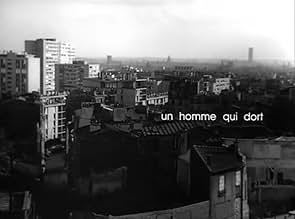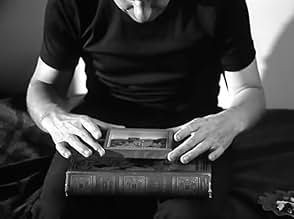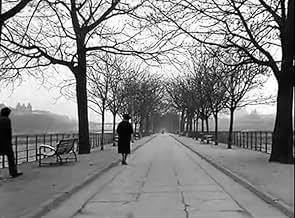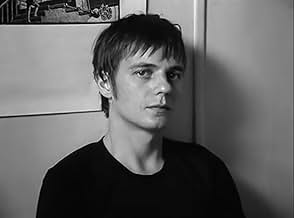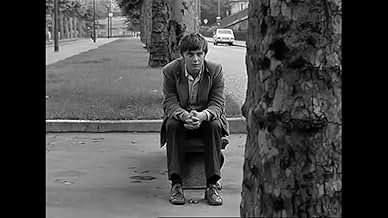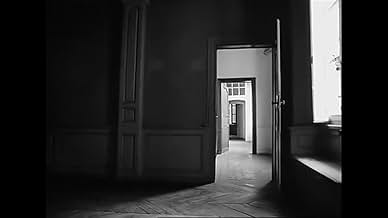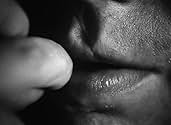Un homme qui dort
- 1974
- Tous publics
- 1h 17m
IMDb RATING
7.9/10
5.2K
YOUR RATING
A 25-year-old male student in Paris becomes indifferent to the world around him, and subsequently feels a strong sense of alienation and hopelessness.A 25-year-old male student in Paris becomes indifferent to the world around him, and subsequently feels a strong sense of alienation and hopelessness.A 25-year-old male student in Paris becomes indifferent to the world around him, and subsequently feels a strong sense of alienation and hopelessness.
- Awards
- 1 win total
Featured reviews
Un Homme Qui Dort is a mesmerizing existentialist trip across different states of mind, with an unusual narrative: only a voice-over speaking out the realizations of the ever-silent, intriguing main character, a student in Paris, who wakes up one day to realize the meaningless of life, and starts discovering the liberation of indifference.
Un Homme Qui Dort is one of the most original, thought-provoking films I've seen in a long time. It effectively portrays an existential crisis, solitude, depression and anxiety, but also peace of mind, using hypnotic, poetic images of 1970s Paris, shot in atmospheric black and white, and accompanied by a haunting soundtrack.
A hidden gem.
Un Homme Qui Dort is one of the most original, thought-provoking films I've seen in a long time. It effectively portrays an existential crisis, solitude, depression and anxiety, but also peace of mind, using hypnotic, poetic images of 1970s Paris, shot in atmospheric black and white, and accompanied by a haunting soundtrack.
A hidden gem.
Famous French writer Georges Pérec was always interested in cinema. He notably took part in Alain Corneau's thriller "Série Noire" (1979) five years after this adaptation of his own novel. Shot by Bernard Quesyanne and awarded with the Jean Vigo prize, the filmmaker found an adequate cinematographic language to capture the somewhat desolate spirit of the novel.
A student who's about to end his studies decides overnight to stay completely indifferent to the world that surrounds him. It's a silent, black & white movie only enhanced by a woman voice over which introduces the young hero to the audience and comments from his own standpoint his actions. Although we don't know the reasons of his retirement from the world, we learn many things of his lifestyle: his bedroom, his wage, his eating habits, his wandering all over Paris etc... It's interesting to note down the mellow voice-over of the woman that gradually gets worried and angered. Indeed, our student is at first completely silent and indifferent but then anxiety, fear overcome here. Is it really possible to stay indifferent like that during a lifetime? Is there a possible exit?
This film could be a cousin of Alain Jessua's debut film "La Vie A L'Envers" (1964) in which a man stops to comply to the routine of everyday life. Such is also the case here. Only the voice-over enables the audience to penetrate the empty soul of this young man and to try to decipher his thoughts although as I previously said his motivations to refrain from social life remain blurred. Through him, Pérec wanted to express his view on French society but in a neutral way. He was always interested in it and showcased it in several of his books especially "La Vie: Mode D'Emploi" (1978). Given the anguished tone adopted by the voice in the second half of the film, the writer probably feels fear towards the banality and the mundane character of everyday life that offers no exits. Perhaps that's what our main hero tries to do: to stay in silence to try to discover another world. But it is bound to fail. So what to do?
Jacques Spiesser is perfectly directed and his expressionless faces capture the nothingness he voluntarily creates all around him. He is at the center of an arty film which tries and succeed to depict the humdrum common life that can verge towards absurdity.
A student who's about to end his studies decides overnight to stay completely indifferent to the world that surrounds him. It's a silent, black & white movie only enhanced by a woman voice over which introduces the young hero to the audience and comments from his own standpoint his actions. Although we don't know the reasons of his retirement from the world, we learn many things of his lifestyle: his bedroom, his wage, his eating habits, his wandering all over Paris etc... It's interesting to note down the mellow voice-over of the woman that gradually gets worried and angered. Indeed, our student is at first completely silent and indifferent but then anxiety, fear overcome here. Is it really possible to stay indifferent like that during a lifetime? Is there a possible exit?
This film could be a cousin of Alain Jessua's debut film "La Vie A L'Envers" (1964) in which a man stops to comply to the routine of everyday life. Such is also the case here. Only the voice-over enables the audience to penetrate the empty soul of this young man and to try to decipher his thoughts although as I previously said his motivations to refrain from social life remain blurred. Through him, Pérec wanted to express his view on French society but in a neutral way. He was always interested in it and showcased it in several of his books especially "La Vie: Mode D'Emploi" (1978). Given the anguished tone adopted by the voice in the second half of the film, the writer probably feels fear towards the banality and the mundane character of everyday life that offers no exits. Perhaps that's what our main hero tries to do: to stay in silence to try to discover another world. But it is bound to fail. So what to do?
Jacques Spiesser is perfectly directed and his expressionless faces capture the nothingness he voluntarily creates all around him. He is at the center of an arty film which tries and succeed to depict the humdrum common life that can verge towards absurdity.
Just watched my whole life. Emptiness of the existence, the pain of existential crisis and the most painful things living, will and idea as Schopenhauer said. "Living painless" is the most painful thing, ironic, but this is the truth.
Ah, my own incapable existence... You are becoming numb when you don't think about the mean of existence and when you don't feel the pain of BEING. HUMAN BEING.
You want to be as usual but you can't, something's gonna stop you, you don't want to read books, you don't want to think, you're just gonna walk without thinking about anything.
Ah, my own incapable existence... You are becoming numb when you don't think about the mean of existence and when you don't feel the pain of BEING. HUMAN BEING.
You want to be as usual but you can't, something's gonna stop you, you don't want to read books, you don't want to think, you're just gonna walk without thinking about anything.
Quite a task making it through. But the ripples and ebbs and flows are well structured. Life can be tedious but this pushes it to the walls. It is a well done experimental film that focuses on a young college student who lives in a claustrophobic little room and does the same things, day after day. A rather monotoned female narrator drones on, although, when things are at their worst, she ups the emotion .Existential French cinema that was entirely new to me.
Can anyone imagine a film with a young student,his room and some pigeons ? This is a film which is going to take your breath away. Of course, it cannot be termed as boring. "Un homme qui dort" is surely not for people who guzzle endless quantities of coke, munch umpteen packets of popcorn while watching what they prefer to call "movies". For me personally it was an rewarding visual experience as there are various breath taking images in this film. The black and white photography dates back to 1974 when this film was made. It is true that during those times color films were made. But this film was filmed in black and white in order to heighten the atmosphere related to monotony,dullness. Yeah, for those who have studied French language and literature: This film is based on a book written by Georges Perec. He even collaborated on this film's scenario. A good news for all those who hunt for rare, hard to find videos. This film is available in France with English subtitles.
Did you know
- TriviaThe film has several paintings by René Magritte: "La reproduction interdite" (1937), over Man's bed is the most prominent. The surreal cinematography also references "Pilgrim" (1966) and possibly other works of his as well. Also featured over the bed is "Relativity" by M.C. Escher.
- How long is The Man Who Sleeps?Powered by Alexa
Details
- Release date
- Countries of origin
- Language
- Also known as
- The Man Who Sleeps
- Filming locations
- Production companies
- See more company credits at IMDbPro
- Runtime1 hour 17 minutes
- Color
- Sound mix
- Aspect ratio
- 1.37 : 1
Contribute to this page
Suggest an edit or add missing content


